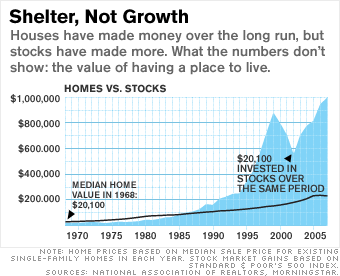
When mortgages were free-flowing and home prices were making stocks look as dull as bonds, many people started looking at their house in a new way. Not only was it a huge moneymaker, but it was a real tangible structure - unlike those fly-by-night dotcoms. With an investment this good, why not take on lots of debt to get in? And why not divert money from the 401(k) to buy even more?
"We were living in a dream world," says Florida financial planner Harold Evensky. The reality is, residential real estate is rarely a high-octane investment. Between 1975 and 2007, single-family-home prices grew just 1.8% above the rate of inflation, according to a study by Harvard's Joint Center for Housing Studies. By comparison, stocks have historically returned more than 7% over inflation. What's more, your choice of "investment" is limited by where you live. And your ability to buy and hold it is affected by outside factors such as having to relocate for work.
None of this means that a house isn't a good buy - you have to live somewhere. It just means it isn't a growth machine. A different real estate play is worth another look, though. Real estate investment trusts, or REITs, give you a basket of largely commercial properties. They pay a healthy income and can diversify your stock-and-bond portfolio to lower overall volatility.
The verdict: Housing skeptics are right, but REITs still make sense.
NEXT: Commodities for all?
